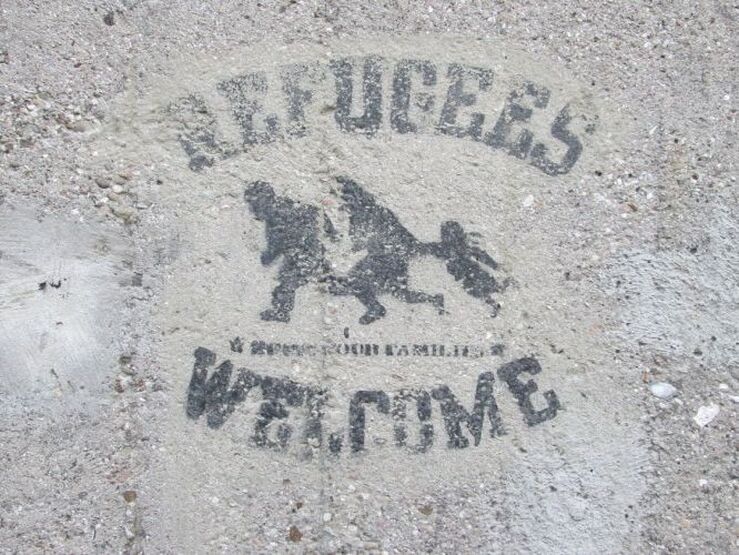|
|
|
Since 2015, several European countries have witnessed an unprecedented involvement of citizens in forms of refugee support which have been gradually identified in public discourse as a newly emerging ‘culture of welcome’. While acts of solidarity are not a new phenomenon, these emerging mobilisations, often enacted by people with no activist background, hint at an inherent tension between the official stance on the ‘refugee crisis’ and the grassroots responses to it.
The experiences of ordinary people hosting refugees in their homes, often with the intermediary role either of NGOs or of local authorities, shows that no matter how micro or widespread, these emerging housing arrangements make for a ‘social lab’ in which broader societal issues can be fruitfully revisited. Interestingly, refugee hospitality initiatives relocate forms of pro-refugee support from the public arena into the intimate space of the domestic. In doing so, they shed light on emerging practices of ‘domestic humanitarianism’, understood not just as an impulse to offer care tied to specific notions of ‘responsible citizen’, but as a mode of helping that takes place inside the home. At the same time, they evoke the contentious reconfiguration of the mainstream views and boundaries of home – who is entitled to belong in a place and call it home – at the domestic, community and national levels.
Our Identities article, ‘Entering into domestic hospitality for refugees: a critical inquiry through a multi-scalar view of home’, draws on in-depth interviews with local hosts, caseworkers/volunteers and guests in Northern Italy to develop a conceptual framework on the implications of refugees’ hospitality, based on a multi-scalar view of home. From the inside, the lived experience of hospitality involves profound redefinitions of domesticity, as well as meaningful personal changes for hosts and guests alike. From the outside, the connective action of local authorities and civil society associations is crucial in shaping the contours, as well as the outcomes, of domestic reception. From the bottom up, hosting refugees is tantamount to opening, and hence questioning, the most intimate threshold of the ‘national we’ against strangers.
Everyday hospitality experiences do not simply operate as individual acts of charity towards strangers. Whereas refugee domestic hospitality may risk reproducing asymmetric dynamics of power and dependence – which have been described as a major pitfall of the humanitarian encounter – they are also entangled in different sets of mutual expectations and needs, and thus result in evolving and open-ended relationships. Furthermore, domestic hospitality holds the potential of forging a counter-narrative on asylum and migration. Opposing xenophobic and racist drives seems to be one of the main motivations among people who decide to host refugees in their homes. As Laura, a host in her thirties, argues: For me it was clear why I wanted to do it. Given the Italian context, I mean, given the direction that was taking the situation... It seemed to me a way to do something in the opposite direction. In my small way, what could I do? I could have done many things. But this one came up and it was very strong the will to react to that political climate. (Laura, 38, Bologna) At every level, understanding the kind of home refugees are let into - symbolically, relationally and literally - is critical to chart the prospects, limitations and societal impact of refugee hospitality. Moreover, an in-depth qualitative gaze illuminates the relational, political and transformative implications of these evolving domestic encounters. Domestic hospitality enables refugees to enter home in both a literal and metaphorical sense, thereby providing a meaningful counter-narrative against the day-to-day emotional and moral foundations of anti-immigrant discourses and politics. By turning the intimate space of the domestic into a resource for solidarity, hospitality subverts from below the essentialised representation of the national home as a space of homogeneous belonging. Despite the inherent power asymmetries and limitations, domestic hospitality can (re)politicise the asylum issue out of a securitarian or charitable framework – even beyond the awareness of its protagonists.
Blog post by Daniela Giudici and Paolo Boccagni, University of Trento, Italy
Read the Identities article: Boccagni, Paolo & Giudici, Daniela. Entering into domestic hospitality for refugees: a critical inquiry through a multi-scalar view of home. Identities: Global Studies in Culture and Power. DOI: 10.1080/1070289X.2021.1909359
Explore other relevant Identities articles:
Local identity and the reception of refugees: the example of Riace Towards a differentiated notion of the mainstream: superdiversity and residents’ conceptions of immigrant integration Intimate citizenship: introduction to the special issue on citizenship, membership and belonging in mixed-status families
0 Comments
Your comment will be posted after it is approved.
Leave a Reply. |
|
Explore Identities at tandfonline.com/GIDE |
|
The views and opinions expressed on The Identities Blog are solely those of the original blog post authors, and not of the journal, Taylor & Francis Group or the University of Glasgow.


